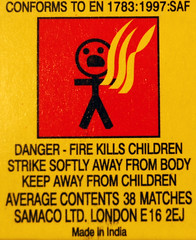Even as someone who started working on the web 12 years ago I am still awed by the ripples spreading out from simple full text search.
Dinner party argument about an obscure fact? Google it. Wish there was a piece of software written by someone that organised your email just-so.. Google it. How much has the Korean market risen over the last couple of years? Google it. Want to find a phone number for restaurant? Yep, Google it.
Economists talk about search costs in the sense of the preamble to a buying decision made by a consumer and although some people have questioned whether web search engines = reduced consumer search costs my personal analysis is that I am now able to find information that 10 years ago I wouldn’t have been able to without investing considerably more time and money.
But what about the quality of that information? In a discussion with a publishing friend a couple of weeks ago she noted that the problem with distinguishing ‘good’ information on the web, was that Google didn’t tell you what was ‘good’ quality information and what was a poor quality information.
Of course, this is not entirely true, as Google’s search results algorithm takes into account the number of people on other websites out there on the web who link to your website, and considers that each outgoing link to your site as a ‘vote’ for the quality of your site (PageRank). All other things being equal, the more incoming links, the closer your website to the top of the search results.
However what if that (perhaps even well-linked to) information out there on the web is just plain wrong?
It’s staggering what well meaning and often highly intelligent people believe just by virtue of having found it on the internet (or having received something by email from a friend ‘check it out’ by simply Googling it to obtain confirmation) and then believe it is true.
Here are three important things (see links for details) you need to know right now about dangerous cancer health risks inside your home:
- having a wifi network in your home increases your chance of cancer and particularly your kids’ cancer risk (if they’ve got one at school speak to your parent teacher association – it should be ripped out right now)
- using underarm deoderant increases your chances of breast cancer
- re-using plastic mineral water bottles gives you cancer as well
There are some giveaways when you read these articles as to their real validity, for instance often the articles concerned will use wording that should set off alarm bells, like (in the BBC article above on wifi networks) “there is insufficient long-term evidence to demonstrate whether such networks are safe”.
Think about this for a minute … what exactly would such evidence look like…. hmmm…. perhaps use of wireless networks for 30 or so years by children with no statistically signficant difference in cancer incidence for them versus non-wifi exposed children? How exactly do you prove something is safe in that sort of context – well I guess there’s 50 years or so experience of use of radio transmitters appearing to be pretty safe but does that ‘prove’ it always safe? Fundamentally I suspect you can’t prove something is safe by this sort of formulation – you can only ‘prove’ something is unsafe.
There is other authoritative documentation on the the web which might seem to undermine the thrust of this BBC article (for example the UK Health Protection Agency here) but it doesn’t necessarily appear at the top of the search results.
For all Google’s comprehensiveness and PageRank the fact that (as of writing) the 4th result for the phrase “underarm deodorant breast cancer aluminium oxide” doesn’t mean that it’s true. Not all web information sources are equal. For example, the National Cancer Institute governmental site says pretty clearly “There is no conclusive research linking the use of underarm antiperspirants or deodorants and the subsequent development of breast cancer.”
Finally, let’s try Googling “cancer re-use of plastic bottles” and as expected there at the number two result all our worst fears are realized. So what does the American Cancer Society have to say about it:
These emails are apparently based on a student’s college thesis. In fact, DEHA is not inherent in the plastic used to make these bottles, and even if it was the U.S. Environmental Protection Agency (EPA) says DEHA “cannot reasonably be anticipated to cause cancer”
This last example is also interesting as the myth appeared to be based on a student’s college thesis, which raises the key point that somewhere in the world you can always find a scientist (sometimes retired) who is prepared by reason of fame, fortune or other more positive reasons, to support your claim.
That doesn’t make it true.
And in effect this very article today is merely perpetuating the three myths above.
Why? Because in spite of the thrust of the paragraphs above, this article links to three websites on the web where the myths are given credence. Because of the links above Google has just received further evidence that perhaps these myths have validity and will rank them higher in search results!
And if you receive an email shortly from a trusted friend claiming that Bill Gates will pay you to forward it, my guess is that somewhere you can find supporting evidence for this on the web.
This article filed under the following 'Interest' categories (click category for more) Unanswerable questions
Article posted by @Drivelry on September 29, 2008
Filed under topics (click for more articles on that topic): cancer risks, wifi dangers
[…] year of death for your personal circumstances if you want to delve into personal risk factors (medical information on the internet is ranked inappropriately but that’s another […]